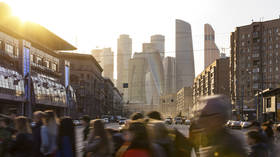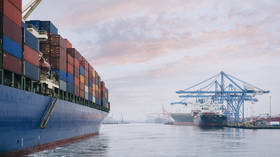Sanctions offer Russia ‘pleasant surprise’ – analysts

The destabilizing effect of sanctions on the Russian economy has been overstated and could evolve into positive developments, business daily RBK reported on Friday, citing economists and officials.
According to the report, the decline in Russian GDP slowed in July, prompting analysts to revise earlier dire predictions.
Data from the Economic Development Ministry show that at the end of July, the decline in GDP was only 1.1% compared to the same period of last year. Back in March, after the introduction of severe Western sanctions, analysts warned of a 23% decline in GDP this year, but six months on, most forecasts say GDP is unlikely to slip by more than 4%, or even “somewhere around 2% or so,” according to First Deputy Prime Minister Andrei Belousov.
“We can see that the shock, which was associated with higher prices in March and April, is gradually passing. To a greater extent it concerns food products, to a lesser extent – non-food items. But demand is gradually starting to come back to life in both cases,” Belousov said at a government meeting this week.
Analysts note that the economy is being increasingly supported by relatively robust consumer demand, and a revival of industries and investment.
“We see a trend of gradual improvement: for some sectors it is a slowdown in the decline, for example in consumer demand, and in some sectors there’s growth, most notably in construction,” Sofia Donets, Renaissance Capital chief economist for Russia and the CIS, explained.
Industrial production data also came as “a pleasant surprise,” falling only 0.5% year-on-year in July due to 2.3% growth in manufacturing, Renaissance Capital economists said in a report on August 25.
Data on investment in fixed assets was also much better than expected, with investments growing by 4.1% in real terms and 21.2% in nominal terms, according to Economic Development Ministry, as businesses strive to complete investment programs despite sanctions.
Moreover, Russia has been witnessing a disinflationary trend after a sharp spike in consumer prices during the spring. Over the last week alone, prices have decreased by 0.16% (0.54% since the beginning of August).
In addition, positive trends are being observed in the labor market, with average real wages slowing their decline in June (3.2% from 6.1% in May) and unemployment remaining at historic lows for the third month in a row in July.
According to chief economist of Expert RA rating agency Anton Tabakh, the current situation gives reason for “moderate short-term optimism” that the country’s GDP will not drop from its current level.
However, Alexander Shirov of the Institute of Economic Forecasting of the Russian Academy of Sciences, warns that positive statistics should not lead to “success giddiness” as Russia is still in the midst of a long-lasting crisis and has to keep taking measures to support its economy.
For more stories on economy & finance visit RT's business section














